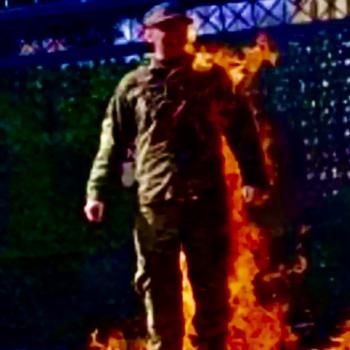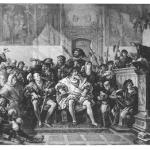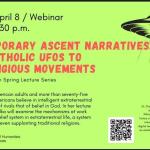Vatican City, Nov 22, 2015 / 04:02 pm (CNA/EWTN News).- Pope Francis' visit to the Central African Republic next week will be the first time he steps into an active war zone. It is a meaningful visit for locals which portrays the image of father coming to console his suffering children. “In the minds and hearts of the people (Pope Francis) is a great figure,” Fr. Hervé Hubert Koyassambia-Kozondo said in an interview with CNA. So to hear his message from within the borders of their own country “is very, very meaningful.” Even a month ago images of Francis could be seen throughout the country through TV and the media, he said, explaining that the Pope is being talked about daily, so he's “already there in reality.” To see the Pope in person in their own community isn't something that happens every day for citizens of the Central African Republic, he said, but for many will only happen “once in their lives.” “So they are waiting for him and they will welcome him as a true pastor of the universal Church. I like to say father, as a father, truly.” Francis' words will be welcomed especially by the country's Christian population, the Catholics in particular. “What the Pope says in favor of peace will have a lot of weight,” he said, but stressed that this peace must also be worked for. Fr. Kozondo is from the archdiocese of Bangui, the capital of the Central African Republic, and is currently studying in Rome. He spoke with journalists ahead of Pope Francis’ Nov. 29-30 visit to the country, as part of a wider visit to the African continent. Pope Francis will be in Africa Nov. 25-30, and is scheduled to make stops in three countries. He will set foot in Kenya first, where he will stay from Nov. 25-27, before moving on to Uganda Nov. 27-29. His last stop will be the Central African Republic, from Nov. 29-30. The last pontiff to visit the CAR was St. John Paul II in 1985, as part of a larger trip to Togo, the Ivory Coast, Cameroon, Zaire and Kenya. Likely the greatest challenge Francis will face in the Central African Republic is the fact that the visit marks the first time he will be stepping into an active war zone, with new deaths reported daily. The majority of tensions began in late 2012 when several bands of mainly Muslim rebel groups formed an alliance, taking the name Seleka. They left their strongholds in the north of the country and made their way south, seizing power from then-president Francois Bozize. Since then, fear, uncertainty and violence have swept over the country in a conflict that has so far left some 6,000 people dead. The country will hold both presidential and parliamentary elections Dec. 27, after they were postponed in October due to violence and instability. Interim president Catherine Samba-Panza, who has so far struggled to keep peace, will not be a candidate. In his comments to journalists, Fr. Kozondo remarked that the greatest challenge the Church faces is “the deplorable situation of the country,” as well as the grave lack of security. “There are many armed people, and (the government forces) still haven't been able to disarm them,” he said, adding that “armed people with bad intentions can’t be something stable in terms of peace.” “Disarmament is needed, but the country doesn't have the means to disarm. So it must count on foreign or external help to act.” Though the country has seen coups throughout their history, the priest explained that this one is different due the fact it is fueled by arms from foreigners, and because Christians are being targeted. With a population of just over 1 million, roughly 36 percent are Catholic and 44 percent are Protestants, with the remaining 20 percent divided evenly among Muslims and local religions. Fr. Kozondo said the rebels launched their attacks in part due to the ethnic exclusivity of the former government, as the country has always had ethnic divisions, and politicians usually represent certain ones. However, when the various Muslim rebel groups banded together in 2012, foreign mercenaries helped in seizing weapons, many of whom were from Chad and Sudan. Therefore, many of the fighters are foreigners who don't speak the local Sango language. This detail compounded with the fact that attacks targeted cities that weren't strategically useful in conquering the country – as well as innocent civilians, state structures and symbols representing the nation’s patrimony – made the people wonder their intentions were for “something more, not only a desire to conquer the power,” the priest said. A second characteristic which has made this conflict unusual compared to those of the past is that amid the various rebellions, it was obvious attacks were “directed toward Christians, against churches and religious structures, against the social Christian structures.” The systematic violence toward Christian persons and the destruction of Church properties is what fueled the current anti-Muslim sentiments, he said, because what people saw is that “it wasn't just a rebellion that sought to conquer the country, but also sought to destroy everything that was Christian.” Before the conflict erupted in 2012 relations with Islam had been relatively peaceful, Fr. Kozondo said, explaining that though they are a minority, Muslims in CAR have always been well integrated and economically powerful because of their savvy in negotiating different affairs. Fr. Kozondo said that another challenge is to re-establish the authority of the State, because they have lost control of the situation since the radicals began their offensive, leading ordinary citizens to take up arms. Once citizens saw that the country's army was ineffective against the rebels, they formed a resistance group, known as anti-balaka, because there was “no one to defend the population.” The population feels that they don't have any protection, “so they organize on their own to defend themselves,” the priest observed. However, he clarified what he referred to as a media farce depicting the “anti-balaka” resistance group as radical Christians who have taken up arms against the Muslims. Though the group is depicted as being exclusively Christian, Fr. Kozondo said he believes this image was “created by the media to imprint in the mind of the people.” He told CNA that while there are certainly Christians, Catholics and Protestants included, who have taken up arms, “They don’t do it in the name of Christianity.” “They don’t do it with means that come from the Church or something organized by the Church. They don’t do it from a Christian push, something that comes in the name of the Christian faith, this no. It’s not a Christian group that goes around in a sullen way against Muslims.” Fr. Kozondo explained that the bishops and the episcopal conference have repeatedly denounced the idea that the “anti-balaka” group is being pushed by Christians. In fact, Catholic and Protestant leaders in CAR have joined forces alongside moderate Muslims to give a concrete, pastoral response to the situation, particularly regarding the large number of refugees and those internally displaced by the fighting. “There are many people whose homes were destroyed or who don't find themselves in safety,” the priest said, noting that many have either fled to nearby countries or are even taking refuge “in the forests.” Fighting now includes the element of revenge-killings, the priest said, explaining that in the capital, Bangui, there is a Muslim quarter entirely closed off to Christians which is particularly dangerous. Inside, there is “a strong presence of jihadists and extremists” who have killed either non-Muslims or moderate Muslims seeking to enter and offer assistance to those inside, as well as to help those who want to leave get out. “What happens is if they kill someone there, there is also a revenge to kill a Muslim in another area. If a Muslim is killed, there is also a revenge on their part,” Fr. Kozondo observed. “The things are also a situation of uncertainty. Today everything is ok. Tomorrow if someone is killed, something could erupt. This is what it’s becoming. Then, the civil population is in the middle.” Pope Francis himself is scheduled to visit the quarter Nov. 30, his last day in Africa, for a meeting with CAR's Muslim community at the central Mosque of Koudoukou. Though many have advised against the decision, as of now it’s still on the Pope's slate. Additionally, the Pope is also scheduled to visit a refugee camp that houses 1000-2000 people the same day he lands in Bangui, Nov. 29, after meeting with the country's authorities and interim president, Catherine Samba-Panza. During a Nov. 19 press briefing, Vatican spokesman Fr. Federico Lombardi said that Francis is visiting CAR precisely “to show that he's close to the people who suffer. So that's why it's his first stop after meeting the authorities.” After visiting the refugee camp, the Pope is slated to meet with the different Evangelical communities in CAR at the FATEB Headquarters (Evangelical Faculty of Theology of Bangui). It's a meeting, Fr. Lombardi said, directed “against the violence,” and will therefore draw together major Church leaders from the Catholic and Evangelical communities, as well as an imam, “seeking to build dialogue and peace.” In recent weeks speculation has arisen as to whether Pope Francis will decide to call off his visit to CAR completely due to the ongoing violence. On Nov. 16, the Vatican Secretary of State, Cardinal Pietro Parolin, suggested that while the plan as of now remains the same, the days in CAR could be cut off at the last minute. Speaking with journalists after a conference in Rome organized by the Opera Romana Pellegrinaggi (Rome Pilgrim Office), Cardinal Parolin said that as far as Africa goes “the three stops remain, but we'll see depending on the situation on the ground.” In a Nov. 11 article, French newspaper Le Monde reported that officials at the French Ministry of Defense said the 900 French troops on the ground in CAR wouldn’t be able to guarantee the Pope’s safety, and would only be able to protect him at the airport. The head of the Vatican's security forces, Domenico Giani, is currently in CAR for a final assessment of the situation ahead of the Pope's arrival in Africa next week. However, instead of flying back to Rome and traveling with Francis on board the papal plane as usual, he will stay, and meet the Pope directly in Kenya. Fr. Lombardi stressed that Giani's presence doesn't signify anything new, and that as of now “nothing has changed.” “We're monitoring,” he said, adding that final decisions will be made “as the trip continues.” The spokesman also announced that Cardinal Parolin will not be with the Pope in CAR, but will leave after Uganda in order to go to Paris for the launch of the Nov. 30-Dec. 11 United Nations Climate Change Conference. Fr. Kozondo said that people are very enthusiastic for the Pope’s visit, and many believe it will be “a turning point” for the country. “They are preparing a lot every day,” he said, explaining that there is also an effort to quell the violence, so that Francis finds “a better situation” when he arrives. He told CNA that he believes the first step to working for lasting peace is “disarmament,” which is something that so far the country has been unable to achieve. “Without this, there will be people who don't feel safe,” he said, explaining that when people don't feel safe, they will continue to organize in an autonomous way to defend themselves. “It's very dangerous, very harmful when you can no longer protect the people, and the people organize themselves on their own. That is what we’re living.” Read more




















